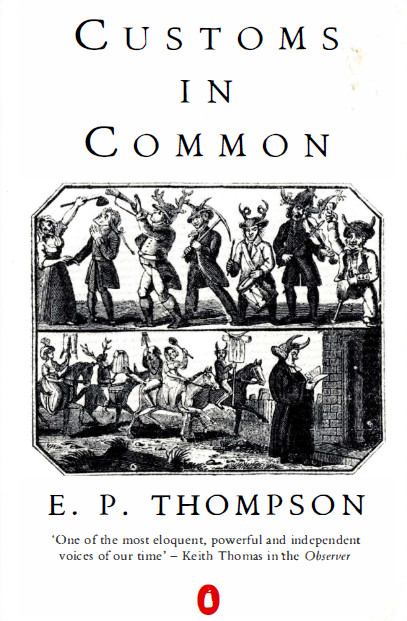0802抄书
E.P. Thompson, , Penguin Books, 1991.
"Introduction: Custom and Culture" 引言:风俗与文化 pp.14-15
If I were to nominate those components of the bundle which makes up "popular culture" which most require attention today, these would include "needs" and "expectations." The industrial revolution and accompanying demographic revolution were the backgrounds to the greatest transformation in history, in revolutionising "needs" and in destroying the authority of customary expectations. This is what most demarks the "pre-industrial" or the "traditional" from the modern world. Successive generations no longer stand in an apprentice relation to each other. If we need a utilitarian apologia for our historical enquiry into custom - but I think we do not - it might be found in the fact that this transformation, this remodeling of "need" and this raising of the threshold of material expectations (along with the devaluation of traditional cultural satisfactions) continues with irreversible pressure today, accelerated everywhere by universally available means of communication. The pressures are now felt among one billion Chinese, as well as countless millions in Asian and African villages.
若要我提出组成“大众文化”这个复杂概念当中,今天尤其值得注意的若干要素,当中必然包括“需求”与“期望”。工业革命以及与之相伴的人口革命为人类历史中的最伟大转型提供了背景:彻底变革了人们的“需求”,并毁灭了风俗所规定的“期待”之权威性。这是“前工业革命”或“传统”世界与现代世界最重要的一个区分。一代又一代的人们不再以学徒的身份承继祖先的事业。如果我们需要为关于风俗的历史研究找一个现实的借口--虽然我不认为有这个必要--我们可以说,这一现代转型,这一对需求的重塑以及物质期望界限的提升(以及传统文化满足感的贬值),在今天仍然以不可逆的势头继续,并到处凭藉大众传媒的普及而加速进展。现在这一趋势已经蔓延到了十亿中国人当中,以及亚洲与非洲上百万的村落。
It is not simple to discuss these problems from our comfortable perspective to the "North" of the global divide. ... Yet we know also that global expectations are rising like Noah's flood, and that the readiness of the human species to define its needs and satisfactions in material market terms - and to throw all the globe's resources onto the market - may threaten the species itself (both South and North) with ecological catastrophe. The engineer of this catastrophe will be economic man, whether in classically avaricious capitalist form or in the form of the rebellious economic man of the orthodox Marxist tradition.
从我们养尊处优的“北半球”视角来讨论这个问题,并不是简单的事。……但我们清楚的知道,全球性的期望正如诺亚的洪水一样上涨;人类这个种群如此乐于用物质与市场的条件来定义自己的需要与满足,并且即将把整个地球的资源都投入市场--将会引起生态性的灾害,从而威胁到我们这个物种本身的存续(不管是北方或南方)。而这场灾害的制造者将是经济性的人,他既以经典的贪婪资本家形象出现,又可以是正统马克思主义所期望的反叛者。
As capitalism (or "the market") made over human nature and human need, so political economy and its revolutionary antagonist came to suppose that this economic man was for all time. We stand at the end of a century when this must now be called in doubt. We shall not ever return to pre-capitalist human nature, yet a reminder of its alternative needs, expectations and codes may renew our sense of our nature's range of possibilities. Could it even prepare us for a time when both capitalist and state communist needs and expectations may decompose, and human nature may be made over in a new form? This is, perhaps, to whistle into a typhoon. It is to invoke the rediscovery, in new forms, of a new kind of "customary consciousness", in which once again successive generations stand in apprentice relation to each other, in which material satisfactions remain stable (if more equally distributed) and only cultural satisfactions enlarge, and in which expectations level out into a customary steady state. I do not think that this is likely to happen. But I hope that the studies in this book may illuminate how custom is formed and how complex is its operation.
当资本主义(或“市场”)暗中重塑着人性与人欲,(资本主义)政治经济学与其革命性的对手将会假设,人类也许从古到今都是经济性的动物。我们正站在这个世纪的末尾,必须对此假设发出质疑。人类永远不会回到前资本主义的人性了,但历史研究提醒我们另外一些需求、期望与行为准则的存在,它们让我们了解到人性的多重可能。也许这样的提醒,甚至能让我们期待一个未来的时代,当资本主义与国家社会主义下人的需求与期望逐渐瓦解,从而人性可以被重塑为一种新的形态?这也许不过是对着呼啸的台风吹口哨。但我们研究过去的风俗,是为了重新发现一种对风俗习惯的自觉性与新的形式;在那里,新一代人重新以学徒的态度面对上一代人;在那里,物质需求变得相对稳定(最好分配能够更加公平);在那里,只有文化上的满足感得以无限提升,而人类的期望平复到一种约定俗成的稳定状态。我并不认为这些真的有可能会成为现实。但我希望,这本书中的研究至少可以揭示风俗如何形成,及其运作的复杂性。
"Introduction: Custom and Culture" 引言:风俗与文化 pp.14-15
If I were to nominate those components of the bundle which makes up "popular culture" which most require attention today, these would include "needs" and "expectations." The industrial revolution and accompanying demographic revolution were the backgrounds to the greatest transformation in history, in revolutionising "needs" and in destroying the authority of customary expectations. This is what most demarks the "pre-industrial" or the "traditional" from the modern world. Successive generations no longer stand in an apprentice relation to each other. If we need a utilitarian apologia for our historical enquiry into custom - but I think we do not - it might be found in the fact that this transformation, this remodeling of "need" and this raising of the threshold of material expectations (along with the devaluation of traditional cultural satisfactions) continues with irreversible pressure today, accelerated everywhere by universally available means of communication. The pressures are now felt among one billion Chinese, as well as countless millions in Asian and African villages.
若要我提出组成“大众文化”这个复杂概念当中,今天尤其值得注意的若干要素,当中必然包括“需求”与“期望”。工业革命以及与之相伴的人口革命为人类历史中的最伟大转型提供了背景:彻底变革了人们的“需求”,并毁灭了风俗所规定的“期待”之权威性。这是“前工业革命”或“传统”世界与现代世界最重要的一个区分。一代又一代的人们不再以学徒的身份承继祖先的事业。如果我们需要为关于风俗的历史研究找一个现实的借口--虽然我不认为有这个必要--我们可以说,这一现代转型,这一对需求的重塑以及物质期望界限的提升(以及传统文化满足感的贬值),在今天仍然以不可逆的势头继续,并到处凭藉大众传媒的普及而加速进展。现在这一趋势已经蔓延到了十亿中国人当中,以及亚洲与非洲上百万的村落。
It is not simple to discuss these problems from our comfortable perspective to the "North" of the global divide. ... Yet we know also that global expectations are rising like Noah's flood, and that the readiness of the human species to define its needs and satisfactions in material market terms - and to throw all the globe's resources onto the market - may threaten the species itself (both South and North) with ecological catastrophe. The engineer of this catastrophe will be economic man, whether in classically avaricious capitalist form or in the form of the rebellious economic man of the orthodox Marxist tradition.
从我们养尊处优的“北半球”视角来讨论这个问题,并不是简单的事。……但我们清楚的知道,全球性的期望正如诺亚的洪水一样上涨;人类这个种群如此乐于用物质与市场的条件来定义自己的需要与满足,并且即将把整个地球的资源都投入市场--将会引起生态性的灾害,从而威胁到我们这个物种本身的存续(不管是北方或南方)。而这场灾害的制造者将是经济性的人,他既以经典的贪婪资本家形象出现,又可以是正统马克思主义所期望的反叛者。
As capitalism (or "the market") made over human nature and human need, so political economy and its revolutionary antagonist came to suppose that this economic man was for all time. We stand at the end of a century when this must now be called in doubt. We shall not ever return to pre-capitalist human nature, yet a reminder of its alternative needs, expectations and codes may renew our sense of our nature's range of possibilities. Could it even prepare us for a time when both capitalist and state communist needs and expectations may decompose, and human nature may be made over in a new form? This is, perhaps, to whistle into a typhoon. It is to invoke the rediscovery, in new forms, of a new kind of "customary consciousness", in which once again successive generations stand in apprentice relation to each other, in which material satisfactions remain stable (if more equally distributed) and only cultural satisfactions enlarge, and in which expectations level out into a customary steady state. I do not think that this is likely to happen. But I hope that the studies in this book may illuminate how custom is formed and how complex is its operation.
当资本主义(或“市场”)暗中重塑着人性与人欲,(资本主义)政治经济学与其革命性的对手将会假设,人类也许从古到今都是经济性的动物。我们正站在这个世纪的末尾,必须对此假设发出质疑。人类永远不会回到前资本主义的人性了,但历史研究提醒我们另外一些需求、期望与行为准则的存在,它们让我们了解到人性的多重可能。也许这样的提醒,甚至能让我们期待一个未来的时代,当资本主义与国家社会主义下人的需求与期望逐渐瓦解,从而人性可以被重塑为一种新的形态?这也许不过是对着呼啸的台风吹口哨。但我们研究过去的风俗,是为了重新发现一种对风俗习惯的自觉性与新的形式;在那里,新一代人重新以学徒的态度面对上一代人;在那里,物质需求变得相对稳定(最好分配能够更加公平);在那里,只有文化上的满足感得以无限提升,而人类的期望平复到一种约定俗成的稳定状态。我并不认为这些真的有可能会成为现实。但我希望,这本书中的研究至少可以揭示风俗如何形成,及其运作的复杂性。
Labels: History_General



0 Comments:
Post a Comment
Subscribe to Post Comments [Atom]
<< Home